
কোভিড-১৯ করোনাভাইরাস প্রাদুর্ভাবের কারণে ওয়াল স্ট্রিট সফলভাবে ভালুকের বাজারের বিরুদ্ধে লড়াই করেছে। কিন্তু আমেরিকান অর্থনৈতিক পুনরুদ্ধার সম্পূর্ণ হতে অনেক দূরে, এবং ভাইরাসটি সারা দেশে দেউলিয়াত্ব ফাইলিংকে প্ররোচিত করে চলেছে৷
ইনভেস্টমেন্ট ব্যাঙ্ক Jefferies-এর গবেষণা দেখায় যে 2020 সালের জুলাই এবং আগস্টের মধ্যে বড়-ফার্মের দেউলিয়া হওয়া তিনগুণেরও বেশি বছর ধরে বেড়েছে এবং বৃহৎ-ফার্মের দেউলিয়াত্ব আগস্টের শেষ পর্যন্ত দ্বিগুণেরও বেশি হয়েছে। 2020 সালের শেষ নাগাদ, মার্কিন যুক্তরাষ্ট্রে কর্পোরেট দেউলিয়াত্ব 10 বছরের সর্বোচ্চে পৌঁছেছে।
স্টেপ-আপ ভ্যাকসিনেশনের পিছনে তৈরি অর্থনৈতিক পুনরুদ্ধারের জন্য 2021 ততটা খারাপ ছিল না – এই বছরের 30 এপ্রিল পর্যন্ত 183টি ফাইলিং 2020 সালের এই মুহুর্তে 207 ফাইলিংয়ের চেয়ে কম ছিল, S&P গ্লোবাল বলছে। এখনও, COVID-19 স্পষ্টতই এর টোল নিচ্ছে।
অনেক ক্ষেত্রেই, কোভিড সাধারণভাবে একটি খড় যা উটের পিঠ ভেঙে দিয়েছে। বিশেষ করে খুচরা শিল্প গত বছর-প্লাস একটি যন্ত্রণাদায়ক সহ্য করেছে। এই চেইনগুলির মধ্যে অনেকগুলি ইতিমধ্যেই ঋণে চাপা পড়েছিল এবং পরিবর্তনশীল রুচি এবং আমেরিকানদের ই-কমার্স গ্রহণের কারণে দীর্ঘমেয়াদী পতনের শিকার হয়েছিল এবং অবশেষে প্রান্তে ঠেলে দেওয়া হয়েছিল৷
তবে দেউলিয়া হওয়ার বিস্ফোরণটি খুচরা বিক্রিতে সীমাবদ্ধ থাকেনি। COVID-19 বিভিন্ন শিল্পের সংস্থাগুলিকে অধ্যায় 11 দেউলিয়াত্ব সুরক্ষা এবং অন্যান্য ধরণের ত্রাণ খুঁজতে বাধ্য করেছে। জ্বালানি খাত, যেখানে 2014-16 সালের তেলের পতন বেশ কয়েকটি অনুসন্ধান এবং উত্পাদন সংস্থাকে দুর্বল করেছিল, সেখানে করোনভাইরাস-স্পর্কিত তেল-চাহিদা মন্দা বেশ কয়েকটি ক্ষেত্রে কাজটি শেষ করতে দেখেছিল। রেস্তোরাঁ এবং বিনোদন শিল্পের কিছু আর্থিকভাবে বিপর্যস্ত কোম্পানিগুলিও ভেঙে পড়েছে।
শুধু মনে রাখবেন:দেউলিয়া হওয়া সব সময় "শেষ" হয় না।
অনেক ক্ষেত্রে, অধ্যায় 11 পুনর্গঠন এবং অন্যান্য কৌশলগুলি কোম্পানিগুলিকে উল্লেখযোগ্য পরিমাণে ঋণ ঝরাতে সাহায্য করে, যাতে তারা এগিয়ে যাওয়ার একটি নতুন পথ খুঁজে বের করার চেষ্টা করার সময় তাদের কাজ চালিয়ে যেতে দেয়। প্রকৃতপক্ষে, এই তালিকায় আমাদের সাম্প্রতিক আপডেটে এমন অনেক কোম্পানি রয়েছে যারা 2020 সালে অধ্যায় 11 দেউলিয়াত্ব সুরক্ষার জন্য দাখিল করেছিল, কিন্তু তারপর থেকে তারা জীবনের দ্বিতীয় লিজ নিয়ে আবির্ভূত হয়েছে।
এখানে 32টি সংস্থা রয়েছে যাদের দেউলিয়া হওয়ার ফাইলগুলি COVID-19 প্রাদুর্ভাবের জন্য তৈরি করা যেতে পারে৷ বেশিরভাগ ক্ষেত্রে, এই ব্যবসাগুলি ইতিমধ্যেই আর্থিক চাপের লক্ষণ দেখাচ্ছে - করোনাভাইরাস কেবল তাদের হাত জোর করে। সৌভাগ্যবশত, এই কোম্পানিগুলির মধ্যে বেশ কয়েকটির জন্য, দেউলিয়া হওয়া আসলেই শেষ ছিল না।
দেউলিয়া হওয়ার তারিখ অনুযায়ী কর্মচারী এবং অবস্থানের সংখ্যা। অন্য সব তথ্য 26 জুলাই পর্যন্ত
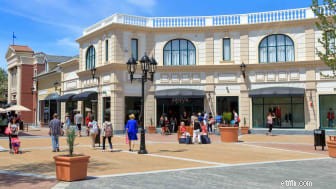
ওয়াশিংটন প্রাইম গ্রুপ (WPG, $1.65), একটি শপিং-সেন্টার রিয়েল এস্টেট ইনভেস্টমেন্ট ট্রাস্ট (REIT), নিজেকে "খুচরা সম্পত্তির মালিকানা, পরিচালনা, অধিগ্রহণ এবং উন্নয়নে স্বীকৃত নেতা" হিসাবে বর্ণনা করে৷ কোম্পানি বলে যে তার সম্পত্তি প্রতি বছর 400 মিলিয়নেরও বেশি অতিথিকে আকর্ষণ করে৷
যাইহোক, 2020 একটি সাধারণ বছর ছাড়া আর কিছুই ছিল না এবং এতে অতিথির সংখ্যা কমে গেছে।
মহামারীটি অস্থায়ী মল এবং স্টোর বন্ধ করতে বাধ্য করে এবং ক্রেতাদের বাড়িতে রাখে। খুচরা বিক্রেতারা ভাড়া ত্রাণের জন্য চাপ দেয় এবং কিছু পুরোপুরি বন্ধ হয়ে যায়। এর ফলে WPG-এর মতো খুচরা জমিদারদের ওপর চাপ পড়ে৷
৷ওয়াশিংটন প্রাইম গ্রুপ 13 জুন অধ্যায় 11 দেউলিয়া সুরক্ষার জন্য দাখিল করেছে। এর প্রস্তাবে WPG-এর $950 মিলিয়ন ঋণ পুনর্গঠিত হবে, যখন ঋণদাতারা দেউলিয়া হওয়ার প্রক্রিয়া চলাকালীন কোম্পানিটিকে কাজ করার অনুমতি দেওয়ার জন্য $100 মিলিয়ন অর্থায়নে সম্মত হয়েছে।
এটি পুনঃসংগঠিত হওয়ার সাথে সাথে, ওয়াশিংটন প্রাইম বলে যে এটি যথারীতি ব্যবসা হবে:
"কোম্পানি আশা করে যে আমাদের অতিথি, ভাড়াটে, বিক্রেতা, স্টেকহোল্ডার এবং সহকর্মীদের সুবিধার জন্য ক্রিয়াকলাপগুলি সাধারণ কোর্সে অব্যাহত থাকবে," WPG বলে৷

কাগজের উৎস , যা 1983 সালে প্রতিষ্ঠিত হয়েছিল, গ্রিটিং কার্ড, আমন্ত্রণপত্র, উপহারের মোড়ক, কাগজের ক্রাফ্ট কিট, ক্রাফ্টিং সরবরাহ এবং সম্পর্কিত পণ্য বিক্রি করে। মহামারী চলাকালীন এর বেশিরভাগ দোকান সাময়িকভাবে বন্ধ করতে বাধ্য হয়েছিল, খুচরা বিক্রেতার উপর চাপ সৃষ্টি করেছিল।
কোম্পানিটি বাড়িওয়ালাদের কাছ থেকে ভাড়া বিরতি চেয়েছে এবং বিক্রেতাদের সাথে অর্থপ্রদানের শর্ত প্রসারিত করেছে বলে জানা গেছে। যাইহোক, $100 মিলিয়নের বেশি ঋণ এবং $36 মিলিয়ন বার্ষিক লিজ খরচ সহ, পেপার সোর্স অধ্যায় 11 দেউলিয়া সুরক্ষার জন্য ফাইল করতে বাধ্য হয়েছিল। পরিকল্পনাটি ছিল 11টি দোকান বন্ধ করে দেওয়া কিন্তু বাকি অবস্থানগুলি এবং এর ই-কমার্স কার্যক্রম চালিয়ে যাওয়া।
মে মাসে, এলিয়ট ইনভেস্টমেন্ট ম্যানেজমেন্ট, যা বার্নস অ্যান্ড নোবেলের মালিক, বলেছিল যে এটি পেপার সোর্স অর্জন করবে, এটিকে অধ্যায় 11 থেকে বেরিয়ে আসার জন্য প্রয়োজনীয় তহবিল সরবরাহ করবে৷
যদিও অনেক খুচরো দেউলিয়া হওয়া মহামারীর সাথে জড়িত হতে পারে, এটি তার দুর্বল আলোকবিজ্ঞানের জন্য দাঁড়িয়েছে।
কয়েক ডজন অভিবাদন কার্ড বিক্রেতারা রিপোর্ট করেছেন যে কাগজের উত্স ফাইল করার ঠিক আগে অস্বাভাবিকভাবে বড় অর্ডার দিয়েছে (কিছু অভিযোগ স্বাভাবিক আকারের চারগুণ)। এছাড়াও, মহামারী চলাকালীন কোম্পানির নির্বাহীদের বোনাস হিসাবে $1.47 মিলিয়ন প্রদান করা হয়েছিল। এটি দেউলিয়া হওয়ার জন্য দাখিল করার পরে, কোম্পানির নির্বাহীরা অতিরিক্ত $1 মিলিয়ন বোনাস চেয়েছিলেন – এমনকি শত শত ছোট বিক্রেতারা অবৈতনিক হয়ে গেলেও।

মহামারী চলাকালীন অনেক পিজা চেইন সমৃদ্ধ হয়েছিল। পিৎজা সবসময় একটি জনপ্রিয় টেকআউট বিকল্প ছিল এবং অনেক পিৎজা চেইন ইতিমধ্যেই ডেলিভারিতে বিশেষীকরণ করে, তারা লকডাউনের জন্য নিখুঁতভাবে অবস্থান করেছিল।
Cici এর ভিন্ন ছিল টেক্সাস ভিত্তিক চেইন হল একটি পিৎজা বুফে রেস্টুরেন্ট। এবং যখন সিট-ডাউন রেস্তোরাঁগুলি লড়াই করছিল, তখন বুফে-স্টাইলের খাবারগুলি এমনভাবে চাপা পড়ে গিয়েছিল যে অনেকেই হয়তো পুনরুদ্ধার করতে পারেননি।
COVID-19 চেইনের জন্য মারাত্মক প্রমাণিত হয়েছে। মূল কোম্পানি Cici's Holdings-এর আয় 2020 সালে 50%-এর বেশি কমেছে৷ মহামারীর "অনুমানযোগ্য এবং অভূতপূর্ব স্কেল" উল্লেখ করে, কোম্পানি 25 জানুয়ারী 11 অধ্যায় দেউলিয়া সুরক্ষার জন্য ফাইল করেছে, যার মধ্যে $50 মিলিয়ন থেকে $100 মিলিয়ন দায় রয়েছে .
একই সময়ে, ডিএন্ডজি বিনিয়োগকারীরা, যারা গত ডিসেম্বরে Cici-এর ঋণ অধিগ্রহণ করেছিল, তারা বলেছে যে তারা ইক্যুইটির জন্য ঋণের চুক্তিতে কোম্পানিটিকে অধিগ্রহণ করবে। 2021 সালের মার্চ মাসে Cici 11 অধ্যায় থেকে দ্রুত আবির্ভূত হয়।

মিনেসোটা-ভিত্তিক ক্রিস্টোফার অ্যান্ড ব্যাঙ্কস মহামারী দ্বারা দেউলিয়া হয়ে যাওয়া পোশাক খুচরা বিক্রেতাদের দীর্ঘ তালিকায় যোগদান করেছেন।
মহিলাদের পোশাক কোম্পানি 14 জানুয়ারি অধ্যায় 11 দেউলিয়াত্ব সুরক্ষায় প্রবেশ করেছে, "মহামারী এবং এর চলমান প্রভাবের ফলে আর্থিক সঙ্কট" এর ফলাফল৷ ক্রিস্টোফার অ্যান্ড ব্যাঙ্কস মলে পায়ের ট্র্যাফিকের অভাবের মুখোমুখি হয়েছিল, হ্যাঁ, তবে এটি আরও নৈমিত্তিক পোশাকের দিকে ভুগছে কারণ অনেক লোক বাড়ি থেকে কাজ শুরু করেছে৷
একজন ক্রেতা খুঁজে না পাওয়ায়, কোম্পানি জানুয়ারিতে বলেছিল যে এটি 44 জুড়ে তার 400টি স্টোর বন্ধ করার পরিকল্পনা করেছে। যাইহোক, মার্চ মাসে, একটি ফেডারেল দেউলিয়া আদালত তার ই-কমার্স ব্যবসার $12.7 মিলিয়ন আনলোডিংকে সবুজ-বাতাস দিয়েছে, ALCC-এর একটি সহযোগী হিলকো মার্চেন্ট রিসোর্স। দোকান বন্ধ বিক্রয় - ফিক্সচার সহ (কখনই ভাল লক্ষণ নয়) - অবিলম্বে শুরু হয়৷
৷
হিউস্টন-ভিত্তিক FHC হোল্ডিংস (FRANQ, $0.20), Francesca-এর পিতামাতা, 3 ডিসেম্বর অধ্যায় 11 দেউলিয়া সুরক্ষার জন্য দায়ের করেছিলেন। বুটিক মহিলাদের পোশাক বিক্রেতা বেশ কয়েক বছর ধরে লড়াই করছিল বলে জানা গেছে, কিন্তু মহামারীটি অপ্রতিরোধ্য প্রমাণিত হয়েছে। এর অর্ধেক স্টোর শপিং মলে অবস্থিত যা বিষ্ঠা-ডাউন এবং পায়ে চলাচলে ব্যাপক পতনের শিকার হয়েছে, ফ্রান্সেসকার প্রথম ত্রৈমাসিক বিক্রয় 50% কমে গেছে।
কোম্পানী অনলাইন বিক্রয়, এবং একটি কনিষ্ঠ 18-35 জনসংখ্যার জন্য বিপণন ধরার চেষ্টা করা হয়েছে. এটি প্রায় $37 মিলিয়ন ভাড়া পরিশোধে স্থগিত করেছে। এর কোনোটিই অনিবার্যতা থেকে রক্ষা পাওয়ার জন্য যথেষ্ট ছিল না। ডিসেম্বরে কোম্পানি বলেছিল যে এটি তার 700টি স্টোরের মধ্যে 140টি বন্ধ করার পরিকল্পনা করেছে। এটি পরবর্তীতে ক্লোজার তালিকায় অতিরিক্ত 97টি স্টোর যুক্ত করেছে।
ফেব্রুয়ারির শুরুতে, ফ্রান্সেসকাস টেরামার ক্যাপিটাল, টাইগার ক্যাপিটাল গ্রুপ এবং SB360 ক্যাপিটাল গ্রুপ নিয়ে গঠিত একটি গ্রুপের কাছে $18 মিলিয়নে বিক্রি করা হয়েছিল। একটি নতুন $25 মিলিয়ন সম্পদ-ভিত্তিক ঘূর্ণায়মান ক্রেডিট সুবিধার সাথে, ফ্রান্সেসকা তার ই-কমার্স ব্যবসা এবং তার হিউস্টন সদর দফতর সহ অন্তত 275টি বুটিক খোলা রাখার পরিকল্পনা করেছে৷
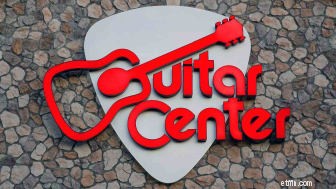
গিটার সেন্টার, মার্কিন যুক্তরাষ্ট্রে বাদ্যযন্ত্রের সবচেয়ে বড় খুচরা বিক্রেতা 21 নভেম্বর, 2020-এ অধ্যায় 11 দেউলিয়াত্ব সুরক্ষার জন্য ফাইল করেছে।
1959 সালে প্রতিষ্ঠিত, গিটার সেন্টারের 269টি খুচরা অবস্থান ছিল, যার বেশিরভাগই মলে অবস্থিত - যা ক্রেতারা করোনভাইরাস মহামারী চলাকালীন এড়িয়ে চলেন। কোম্পানিটি লাভজনক ছিল এবং 2019 সালে $2.3 বিলিয়ন রাজস্বের রিপোর্ট করেছিল, কিন্তু এটি মার্চ, এপ্রিল এবং মে মাসে ইন-স্টোর বিক্রয় "পতন" রিপোর্ট করেছে। তারা কখনই পুরোপুরি সুস্থ হয়নি। এমনকি অনলাইন বিক্রয় হারানো রাজস্ব পূরণে সহায়তা করেও, বিক্রয় এখনও 2019 এর তুলনায় প্রায় 20% কম ছিল।
2014 সালের প্রাইভেট ইক্যুইটি টেকওভার থেকে অবশিষ্ট ঋণের সাথে মিলিত, কোম্পানির IOUs $1.3 বিলিয়ন-এ উঠে গেছে।
গিটার সেন্টার চ্যাপ্টার 11 দেউলিয়াত্ব সুরক্ষা থেকে দ্রুত আবির্ভূত হয়েছে, তবে, 17 ডিসেম্বর একটি অনুমোদিত পুনর্গঠন পরিকল্পনা ঘোষণা করে। পরিকল্পনাটি $800 মিলিয়নেরও বেশি ঋণ মুছে ফেলেছে।

রিয়েল এস্টেট ইনভেস্টমেন্ট ট্রাস্ট CBL &Associates Properties (CBLAQ, $0.13) চ্যাপ্টার 11 দেউলিয়াত্ব সুরক্ষার জন্য 1 নভেম্বর ফাইল করা হয়েছে। মহামারী যেটি ইট-ও-মর্টার খুচরা দোকানগুলিকে ধ্বংস করেছে, সেই কোম্পানির জন্যও খারাপ খবর ছিল, যেটি 100 টিরও বেশি মলের মালিক বা সহ-মালিক। JCPenney-এর মতো অ্যাঙ্কর টেন্যান্টরা দেউলিয়া হয়ে যাওয়া এবং অন্যান্য ভাড়াটেরা ভাড়া দিতে অক্ষম হওয়ায়, CBL প্রপার্টিজ বিনিয়োগকারীদের সতর্ক করতে শুরু করেছে যে এটি সমস্যায় পড়েছে।
এর দেউলিয়াত্ব ফাইলিংয়ে, CBL সম্পত্তিগুলি একটি চুক্তির পরামর্শ দিয়েছে যা প্রায় $1.4 বিলিয়ন ঋণ মুছে ফেলার বিনিময়ে অসুরক্ষিত বন্ডহোল্ডারদের কোম্পানিতে 90% শেয়ার দেবে৷
এপ্রিল মাসে, Bloomberg রিপোর্ট করেছে যে "CBL &Associates Properties Inc. একটি সংশোধিত অধ্যায় 11 প্ল্যান দাখিল করেছে যা তার মূল ঋণদাতাদের সাথে একটি নিষ্পত্তিকে অন্তর্ভুক্ত করে, মল অপারেটরকে তার পুনর্গঠনের আদালতের অনুমোদনের এক ধাপ কাছাকাছি নিয়ে যায়।"
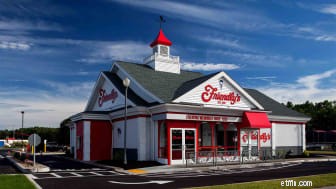
FIC রেস্তোরাঁ৷ – জনপ্রিয় ফ্রেন্ডলি'স রেস্তোরাঁ চেইনের মালিক – তার ব্যবসার উপর "কোভিড-১৯-এর বিপর্যয়কর প্রভাব" উল্লেখ করে 1 নভেম্বর অধ্যায় 11 দেউলিয়াত্ব সুরক্ষার জন্য আবেদন করেছেন।
আইকনিক ইস্ট কোস্ট রেস্তোরাঁ এবং আইসক্রিম চেইনটি 2011 সালে অধ্যায় 11 এর জন্য আবেদন করেছিল এবং একবারে 850টি অবস্থান ছিল, কিন্তু সেটি 50টি কর্পোরেট-মালিকানাধীন এবং 80টি ফ্র্যাঞ্চাইজড অবস্থানে নামিয়ে আনা হয়েছিল৷ মহামারী বিপর্যয়ের আগে কোম্পানিটি গত দুই বছরে একটি পরিবর্তনে অগ্রগতি করছে বলে জানা গেছে। যদিও এটি তার টেকআউট ব্যবসার বৃদ্ধি ঘটিয়েছিল, ফ্রেন্ডলি'স প্রাথমিকভাবে একটি সিট-ডাউন রেস্তোরাঁ ছিল, যা এটিকে বিশেষভাবে দুর্বল করে তুলেছিল৷
কোম্পানি জানিয়েছে যে একটি নতুন মালিকের কাছে একটি নিরবচ্ছিন্ন স্থানান্তর নিশ্চিত করার জন্য অপারেশন চালিয়ে যাওয়ার জন্য তার হাতে পর্যাপ্ত নগদ রয়েছে, এবং এই সময়ের মধ্যে সমস্ত অবস্থান খোলা থাকবে৷
জানুয়ারিতে, Friendly's Amici Partners Group এর কাছে মাত্র 2 মিলিয়ন ডলারে বিক্রি হয়েছিল। Amici Friendly's পরিচালনা চালিয়ে যাওয়ার পরিকল্পনা করেছে, এর মেনু উন্নত করবে (অতিরিক্ত আইসক্রিম বিকল্পগুলি সহ) এবং রেস্তোরাঁর অনলাইন অর্ডার করার ক্ষমতা বৃদ্ধি করবে৷
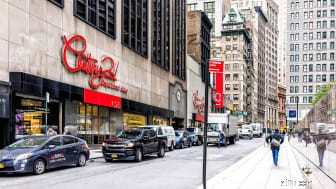
খুচরা বিক্রেতা সেঞ্চুরি 21 , যেটি 1961 সালে ব্রুকলিনে প্রতিষ্ঠিত হয়েছিল এবং আমেরিকার উত্তর-পূর্ব জুড়ে 13টি অবস্থান রয়েছে, এটি বেশ কয়েকটি ডিপার্টমেন্টাল স্টোর চেইনগুলির মধ্যে একটি যেটি COVID-এর উপর চাপ দেওয়ার আগে ই-কমার্সে স্থানান্তরের সাথে দীর্ঘকাল ধরে লড়াই করছিল৷
শেষ পর্যন্ত খুচরা বিক্রেতা সেপ্টেম্বরে তোয়ালে ছুঁড়ে ফেলে, যদিও, অধ্যায় 11 দেউলিয়াত্ব সুরক্ষার জন্য ফাইল করে যখন তার বীমাকারী ব্যবসায়িক বাধা বিমা পেমেন্টে $ 175 মিলিয়ন দিতে অস্বীকার করে যেটি সেঞ্চুরি 21 ফাইল করেছিল।
সিইও রেমন্ড গিন্ডি উল্লেখ করেছেন যে "বীমার অর্থ আমাদেরকে 9/11-এর ধ্বংসাত্মক প্রভাব সহ্য করার পরে পুনর্নির্মাণ করতে সাহায্য করেছিল," 11 সেপ্টেম্বর, 2001, সন্ত্রাসী হামলার পরিপ্রেক্ষিতে প্রাপ্ত অনুরূপ অর্থ প্রদানের কথা উল্লেখ করে, সেঞ্চুরি 21 এর অবস্থানের সাথে সংযুক্ত। বিশ্ব বাণিজ্য কেন্দ্র। কিন্তু অনেক ব্যবসায়িক বাধা নীতি সাধারণত শুধুমাত্র ব্যবসার সরাসরি শারীরিক ক্ষতির ক্ষেত্রে ক্ষতি কভার করে এবং এইভাবে COVID-সম্পর্কিত ক্ষতি কভার করে না।
এই ক্ষেত্রে, সেঞ্চুরি 21 পুনর্গঠন করতে দেউলিয়াত্ব ব্যবহার করবে না, বরং এর পরিবর্তে "এর খুচরা কার্যক্রম বন্ধ করে দেবে" এবং এর অবশিষ্ট অবস্থানগুলি বন্ধ করে দেবে৷
একটি বিদ্রূপাত্মক মোচড়ের মধ্যে, সবচেয়ে মূল্যবান সম্পদ সেঞ্চুরি 21 পাওনাদারদের ঋণ পরিশোধে সহায়তা করার জন্য অবশিষ্ট ছিল তা হল COVID-19 এর কারণে তার ব্যবসায়িক বাধা বিমা পলিসির বিরুদ্ধে $175 মিলিয়ন দাবি। কোম্পানিটি সেই দাবিটি ডিসেম্বরে একজন অপ্রকাশিত ক্রেতার কাছে বিক্রি করেছে৷
৷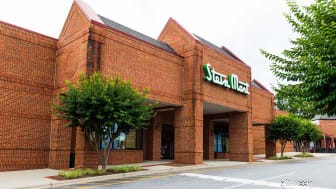
ফ্লোরিডা ভিত্তিক ডিসকাউন্ট ডিপার্টমেন্ট-স্টোর চেইন স্টেইন মার্ট 1908 সাল থেকে ব্যবসা করছে। সেই সময়ে, এটি মিসিসিপিতে তার প্রথম স্টোর থেকে 30টি বিভিন্ন রাজ্য জুড়ে বিস্তৃত হয়েছে। এটি এখন 279টি অবস্থানের পাশাপাশি একটি ই-কমার্স ওয়েবসাইট পরিচালনা করে৷
৷যাইহোক, চেইনটি একটি পুরানো জনসংখ্যার সাথে যুক্ত ছিল - যেটি দোকানে ফিরে যাওয়ার জন্য তাড়াহুড়ো করেনি কারণ মহামারী লকডাউনগুলি তরুণ ক্রেতাদের একই সংখ্যায় তুলে নেওয়া হয়েছিল। কোম্পানিটি ইতিমধ্যেই সমস্যায় পড়েছিল এবং 2018 সালে বেসরকারীকরণের অন্বেষণ করছিল, কিন্তু করোনভাইরাস মহামারী এটিকে একটি ঘাতক ধাক্কা দিয়েছিল৷
Stein Mart অধ্যায় 11 দেউলিয়াত্বের জন্য 12 অগাস্টে দায়ের করেছে৷ কোম্পানিটি লিকুইডেশন বিক্রয় শুরু করেছে এবং স্থায়ীভাবে তার সমস্ত ইট-ও-মর্টার অবস্থানগুলি বন্ধ করে দেবে৷
ডিসেম্বরে, রিটেইল ইকমার্স ভেঞ্চারস (REV) প্রাইভেট-লেবেল ব্র্যান্ড এবং গ্রাহকের ডেটা সহ স্টেইন মার্টের মেধা সম্পত্তির জন্য $6 মিলিয়ন প্রদান করেছে। REV অনলাইন ব্যবসার জন্য তাদের প্রতিস্থাপন করার জন্য সংগ্রামী ব্র্যান্ড কেনার ক্ষেত্রে বিশেষজ্ঞ। কোম্পানি এই বছরের শুরুতে স্টেইন মার্টকে শুধুমাত্র অনলাইন স্টোর হিসেবে পুনরায় চালু করেছে।
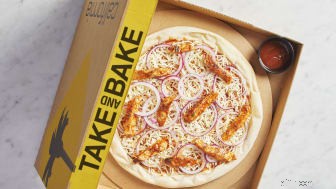
ক্যালিফোর্নিয়া পিজা রান্নাঘর 1985 সাল থেকে তাজা, মৌসুমী উপাদান সমন্বিত ক্যালিফোর্নিয়া-শৈলী পাই পরিবেশন করে আসছে। ব্যক্তিগতভাবে অনুষ্ঠিত চেইনটি সেই সময় থেকে অনেক সংকটের সম্মুখীন হয়েছে, কিন্তু করোনভাইরাস মহামারীর কারণে অস্থায়ীভাবে অবস্থানগুলি বন্ধ করতে বাধ্য হওয়া ছিল বিপর্যয়কর। ডেলিভারির উপর ফোকাস করা অন্যান্য পিৎজা চেইনগুলির থেকে ভিন্ন, CPK তার আয়ের 80% জন্য ইন-রেস্তোরাঁর খাবারের উপর নির্ভর করে।
30 জুলাই, ক্যালিফোর্নিয়া পিৎজা কিচেন ঘোষণা করেছে যে এটি অধ্যায় 11 দেউলিয়াত্ব সুরক্ষার জন্য ফাইল করছে। কোম্পানিটি চালু থাকবে, যদিও কিছু অলাভজনক অবস্থান বন্ধ হয়ে যাবে। বেশিরভাগ CPK রেস্তোরাঁ এখন আউটডোর ডাইনিং এবং ডেলিভারির জন্য আবার খোলা হয়েছে, এবং কিছু ডাইনিং রুমও খুলতে শুরু করেছে। কোম্পানিটি তার CPK মার্কেটের মাধ্যমে খাবারের কিট, পানীয় এবং তাজা পণ্যও বিক্রি করছে।
সিইও জিম হায়াট এই মন্তব্যের প্রস্তাব দেন যখন দেউলিয়াত্ব ফাইলিং ঘোষণা করা হয়:
"আমাদের ক্রিয়াকলাপগুলিতে COVID-19-এর অভূতপূর্ব প্রভাব অবশ্যই অতিরিক্ত চ্যালেঞ্জ তৈরি করেছে, কিন্তু আমাদের ঋণদাতাদের কাছ থেকে এই চুক্তি একটি চলমান ব্যবসা হিসাবে CPK-এর কার্যকারিতার প্রতি তাদের প্রতিশ্রুতি প্রদর্শন করে৷ এই প্রক্রিয়া জুড়ে আমরা একই উদ্ভাবনী, ক্যালিফোর্নিয়া-অনুপ্রাণিত খাবার সরবরাহ করতে থাকব৷ আমরা 35 বছরেরও বেশি সময় ধরে সেবা করছি।"
নভেম্বরে, ক্যালিফোর্নিয়া পিৎজা কিচেন ঘোষণা করেছে যে এটি দেউলিয়াত্ব সুরক্ষা থেকে বেরিয়ে আসছে। কোম্পানিটি $220 মিলিয়ন ঋণ ফেলেছে, এবং একটি নতুন "ক্যালি হেলথ" মেনু প্রসারিত করতে এবং ফোকাস করার জন্য $177 মিলিয়ন মূলধন ধার করেছে। স্বল্পমেয়াদে কোনো ঋণ পরিশোধ না করেই, ক্যালিফোর্নিয়া পিৎজা কিচেন এর পায়ে ফিরে যাওয়ার জন্য কিছু শ্বাস-প্রশ্বাসের জায়গা আছে।

আপনি হয়ত টেইলর্ড ব্র্যান্ডস নামটি চিনতে পারবেন না , কিন্তু আপনি পুরুষদের গুদাম, K&G সুপারস্টোর, JoS সহ কোম্পানির মালিকানাধীন পোশাকের খুচরা বিক্রেতাদের কিছু জানেন। A. ব্যাঙ্ক, এবং কানাডিয়ান ক্লোথায়ার মুরের পোশাক পুরুষদের জন্য।
2014 সালের JoS কেনার অংশ হিসাবে উচ্চ ঋণের কারণে টেইলরড ব্র্যান্ডগুলি ইতিমধ্যেই সংকটে ছিল। একটি ব্যাংক. যখন করোনভাইরাস মহামারী আঘাত হানে, তখন কোম্পানিটি বন্ধ দোকানগুলির দ্বিগুণ আঘাতের সম্মুখীন হয়েছিল, এবং ঘরে বসে কাজ করার প্রবণতা যা স্যুট এবং আনুষ্ঠানিক কাজের পোশাকের চাহিদা তৈরি করেছিল। এর ফলে 2 মে শেষ হওয়া ত্রৈমাসিকের রাজস্ব 60%-এর বেশি কমেছে।
23 জুলাই, টেইলরড ব্র্যান্ডগুলি অধ্যায় 11 দেউলিয়াত্ব সুরক্ষার জন্য আবেদন করেছে। "যদিও আমরা ক্রমাগত মূল্যায়ন করেছি এবং আমাদের কাজ করার উপায়গুলি উন্নত করেছি, কোভিড-১৯ এটা স্পষ্ট করে দিয়েছে যে আমাদের আরও খাপ খাইয়ে নিতে হবে এবং বিকশিত হতে হবে," কোম্পানি বলেছে৷
টেইলর্ড ব্র্যান্ডের স্টক আগস্টে ডিলিস্ট করা হয়েছিল। ডিসেম্বরে, এটি ঘোষণা করে যে এটি একটি ব্যক্তিগতভাবে অনুষ্ঠিত কোম্পানি হিসাবে সফলভাবে পুনর্গঠন করেছে, ফেব্রুয়ারিতে, এটি নতুন "Next Gen" পুরুষদের গুদাম দোকান খুলতে শুরু করেছে। 5 মার্চ, কোম্পানি ঘোষণা করেছে যে এটি তার কৌশলগত পরিকল্পনাগুলিকে এগিয়ে নিয়ে যাওয়ার জন্য $75 মিলিয়ন অর্থায়ন বন্ধ করেছে, যার মধ্যে আরও নেক্সট জেন স্টোর খোলা রয়েছে৷
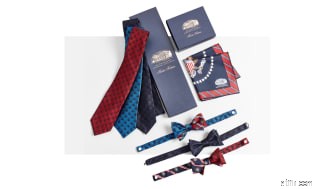
1818 সালে প্রতিষ্ঠিত, আপস্কেল পোশাক খুচরা বিক্রেতা ব্রুকস ব্রাদার্স মার্কিন যুক্তরাষ্ট্রের 45 জন রাষ্ট্রপতির মধ্যে 40 জনের পোশাক পরে গর্বিত। ব্রুকস ব্রাদার্স গৃহযুদ্ধ, প্রথম বিশ্বযুদ্ধ, মহামন্দা এবং দ্বিতীয় বিশ্বযুদ্ধ থেকে বেঁচে গিয়েছিল, কিন্তু কোভিড-১৯ মহামারী অনেক বেশি প্রমাণিত হয়েছিল। কোম্পানিটি 20 জুলাই দেউলিয়াত্ব সুরক্ষার জন্য আবেদন করেছে৷
৷ব্যক্তিগত মালিকানাধীন কোম্পানি, যেটি মার্কিন যুক্তরাষ্ট্রে তার কিছু পণ্য তৈরি করার জন্য সর্বশেষ অবশিষ্ট পোশাকের ব্র্যান্ডগুলির মধ্যে একটি (এটির নিউইয়র্ক, ম্যাসাচুসেটস এবং উত্তর ক্যারোলিনায় সুবিধা রয়েছে), মহামারী হওয়ার আগে নিজেকে বিক্রি করার কথা ভাবছিল। ব্যবসার নৈমিত্তিক ফ্যাশনের বাইরে পড়ে যাচ্ছিল, ভাড়া বেশি ছিল এবং মেসি'স (এম) এর মতো ডিপার্টমেন্ট-স্টোর ক্লায়েন্টরা লড়াই করছিল।
যাইহোক, মহামারীটি কেবল দোকানগুলিই বন্ধ করে দেয়নি এবং "খেলাধুলার" পোশাকের দিকে অগ্রসর হয়েছিল, এটি যে কোনও সম্ভাব্য বিক্রয়ের পথেও নেমেছিল:
"এই কৌশলগত পর্যালোচনার সময়, Covid-19 ব্যাপকভাবে বিঘ্নিত হয়ে পড়ে এবং আমাদের ব্যবসার উপর প্রভাব ফেলেছিল," কোম্পানি লিখেছে৷
2020 সালের সেপ্টেম্বরে, ব্রুকস ব্রাদার্সকে SPARC গ্রুপ নামে একটি অপারেটিং কোম্পানির মাধ্যমে মল অপারেটর সাইমন প্রপার্টি গ্রুপ (SPG) এবং লাইসেন্সিং ফার্ম অথেন্টিক ব্র্যান্ডস গ্রুপকে $325 মিলিয়নে বিক্রি করা হয়েছিল। চুক্তির অংশ হিসাবে, ক্রেতারা ব্রুকস ব্রাদার্সের 125টি খুচরা স্থান খোলা রাখতে সম্মত হয়েছে। পাইকারি, খুচরা এবং ই-কমার্স সহ ব্রুকস ব্রাদার্সের সমস্ত কার্যক্রম পরিচালনা করবে SPARC গ্রুপ৷

সুর লা টেবিল , বিলাসবহুল রান্নাঘর এবং দোকানে রান্নার ক্লাসে বিশেষজ্ঞ একটি ব্যক্তিগতভাবে আয়োজিত খুচরা বিক্রেতা, 8 জুলাই অধ্যায় 11 দেউলিয়া ঘোষণা করেছে৷
কোম্পানির 121 ইউএস স্টোর বন্ধ হয়ে গেছে এবং কোম্পানি বলেছে যে তার দেউলিয়াত্ব ফাইল করা "COVID-19 সঙ্কটের আর্থিক প্রভাবের ফলাফল।" যদিও অবস্থানগুলি পুনরায় খোলা শুরু হয়েছিল, ব্যবসাটি ঘুরে দাঁড়াতে অনেক দেরি হয়েছিল৷
৷সেই সময়ে, সুর লা টেবিল বলেছিল যে এটি স্থায়ীভাবে 51 টি অবস্থান বন্ধ করার পরিকল্পনা করেছে। এবং কোম্পানির 20% কর্মীকে জুন মাসে স্থায়ীভাবে ছাঁটাই করা হয়েছিল৷
৷আগস্টে, মার্কি ব্র্যান্ডস এবং সিএসসি জেনারেশনের মধ্যে একটি অংশীদারিত্বের মাধ্যমে সুর লা টেবিল প্রায় $90 মিলিয়নে কেনা হয়েছিল। সেপ্টেম্বরে, ঘোষণা করা হয়েছিল যে মোট 73টি অবস্থান বন্ধ হয়ে যাবে, নতুন মালিকরা 55টি স্টোর পরিচালনা চালিয়ে যাবে।

শেল ফ্র্যাকিং প্রাকৃতিক গ্যাসের অগ্রগামী চেসাপিক শক্তি (CHK, $55.18) অবশেষে মহামারীর অতিরিক্ত চাপে ভেঙে পড়ে, 28 জুন অধ্যায় 11 দেউলিয়া সুরক্ষার জন্য ফাইল করা হয়৷
চেসাপিক কম প্রাকৃতিক গ্যাসের দাম এবং ঋণের পাহাড়ের সংমিশ্রণের সাথে লড়াই করছিল – 2019 সালের শেষ পর্যন্ত $9.5 বিলিয়ন। ফেব্রুয়ারী থেকে প্রাকৃতিক গ্যাসের দামে পতনের সাথে কারখানাগুলি বন্ধ হয়ে যাওয়ায় জ্বালানীর চাহিদা কমে যাওয়াও প্রমাণিত হয়েছে চেসাপিককে অতিক্রম করার জন্য অনেক কিছু। 2020 সালের প্রথম ত্রৈমাসিকে, কোম্পানিটি $8.3 বিলিয়ন লোকসান করেছে এবং মার্চের শেষে নগদ মাত্র $82 মিলিয়নে নেমে এসেছে।
চেসাপিকের সিইও তার কোম্পানির পুনর্গঠন করার কৌশল বর্ণনা করেছেন, প্রাথমিকভাবে জমা করা ঋণ কমিয়ে যা এটিকে টেনে নিয়ে যাচ্ছিল:
"আনুমানিক $7 বিলিয়ন ঋণ বাদ দিয়ে এবং আমাদের কর্মক্ষমতাকে বাধাগ্রস্ত করে এমন উত্তরাধিকার চুক্তিমূলক বাধ্যবাধকতাগুলিকে মোকাবেলা করার মাধ্যমে, আমরা আমাদের বিভিন্ন অপারেটিং প্ল্যাটফর্ম এবং মূলধন এবং অপারেটিং দক্ষতা এবং প্রযুক্তিগত উৎকর্ষের উন্নতির প্রমাণিত ট্র্যাক রেকর্ডকে পুঁজি করার জন্য চেসাপিককে অবস্থান করছি৷ এই প্রদর্শিত শক্তিগুলির সাথে, এবং একটি উপযুক্ত আকারের মূলধন কাঠামোর সুবিধা, চেসাপিক অধ্যায় 11 প্রক্রিয়া থেকে একটি শক্তিশালী এবং আরও প্রতিযোগিতামূলক উদ্যোগ হিসাবে আবির্ভূত হওয়ার জন্য অনন্যভাবে অবস্থান করবে।"
ফেব্রুয়ারীতে, চেসাপিক এনার্জি এর 15% কর্মী ছাঁটাই করার পরে (220 কর্মী) অধ্যায় 11 দেউলিয়াত্ব সুরক্ষা থেকে প্রস্থান করেছে, বিদ্যমান ঋণে $7.7 বিলিয়ন বিলিয়ন এবং $1 বিলিয়ন নতুন ঋণ বাড়াতে। সংস্থাটি বলেছে যে তারা লুইসিয়ানা এবং উত্তর-পূর্বের প্রাকৃতিক গ্যাস ক্ষেত্রের উপর দৃষ্টি নিবদ্ধ করে তার তেলের উৎপাদন হ্রাস করার পরিকল্পনা করছে। এটি নতুন প্রকল্পগুলিতে প্রতি বছর $700 মিলিয়ন থেকে $750 মিলিয়ন ব্যয় করার লক্ষ্য রাখে যা এটি অনুমান করে যে বিনামূল্যে নগদ প্রবাহে প্রতি বছর $400 মিলিয়ন তৈরি করতে পারে।

সিইসি বিনোদন – পিৎজা এবং বাচ্চাদের বিনোদন রেস্তোরাঁর চেইন চক ই. চিজ-এর মূল কোম্পানি হিসাবে সবচেয়ে বেশি পরিচিত – 25 জুন অধ্যায় 11 দেউলিয়াত্ব সুরক্ষার জন্য দায়ের করা হয়েছে৷
করোনাভাইরাস মহামারী কোম্পানির ব্যবসায় নাটকীয় প্রভাব ফেলেছে। মার্চে শেষ হওয়া ত্রৈমাসিকটি সাধারণত কোম্পানির ব্যস্ততম, তবে একই-স্টোরের বিক্রয় বছরের তুলনায় 21.9% কমেছে। এমনকি পিটার পাইপার টেকআউট চেইন পিজা অফার করে, সিইসি এন্টারটেইনমেন্ট শাটডাউন থেকে ব্যবসার ক্ষতি কাটিয়ে উঠতে পারেনি।
যাইহোক, 30 ডিসেম্বর, CEC এন্টারটেইনমেন্ট ঘোষণা করেছে যে এটি দেউলিয়াত্ব সুরক্ষা থেকে বেরিয়ে আসছে। কার্যধারার পরে, কোম্পানিটি $705 মিলিয়ন ঋণ মুছে ফেলেছিল এবং $100 মিলিয়নের বেশি তারল্য নিয়ে গর্ব করেছিল৷
সিইসি এন্টারটেইনমেন্ট তার রেস্তোরাঁর অবস্থানগুলি পুনরায় চালু করার পরিকল্পনা করেছে যতক্ষণ না "এটি করা নিরাপদ।"

ব্যবসায় 85 বছর পর, GNC হোল্ডিংস জুনে দেউলিয়াত্ব সুরক্ষা চাইতে বাধ্য হয়েছিল। কোম্পানির স্টকটি নিউইয়র্ক স্টক এক্সচেঞ্জ থেকে তালিকাভুক্ত করা হয়েছিল, কিন্তু 2013 সালের শীর্ষে $60 স্তরের তুলনায় শেয়ার প্রতি 44 সেন্টে লেনদেন হয়েছে৷
মহামারী আঘাত হানার আগে জিএনসি ইতিমধ্যেই সমস্যায় ছিল। ভিটামিন এবং স্বাস্থ্য পরিপূরক সংস্থাটি গত ডিসেম্বরে বিনিয়োগকারীদের বলেছিল যে মলগুলিতে ট্র্যাফিক হ্রাসের উল্লেখ করে 2020 সালের শেষ নাগাদ 900টি স্থান বন্ধ করার পরিকল্পনা করছে। করোনভাইরাস লকডাউনের সময় অস্থায়ীভাবে দোকানগুলি বন্ধ করে দেওয়া ছিল চূড়ান্ত আঘাত। প্রথম ত্রৈমাসিকে লোকসান $200 মিলিয়ন, এবং কোম্পানির প্রায় $900 মিলিয়ন ঋণ।
Under its reorganization plan, GNC said that between 800 and 1,200 stores would be permanently closed as it used Chapter 11 to "to right-size store portfolio and improve its capital structure." Remaining GNC retail stores and the company's e-commerce site stayed open during the process.
In September, a federal bankruptcy court judge approved the sale of GNC to China's Harbin Pharmaceutical (GNC's largest shareholder) for $770 million. The sale had raised national security concerns but ultimately was approved. Underperforming stores were to be shuttered, but the company was expected to keep 1,400 GNC retail locations open.

Hertz Global Holdings (HTZZ, $15.00) filed for Chapter 11 bankruptcy protection on May 22. The 102-year-old car rental company was decimated when the coronavirus pandemic all but shut down travel. That capped four years of losses that already had Hertz on shaky ground.
Explaining that "no business is built for zero revenue," the company threw in the towel after its lenders were unwilling to extend the deadline for payments on car leases. At this point, the company was $18.8 billion in debt and had already laid off 12,000 workers – with another 4,000 on furlough.
Hertz continued operations as it restructures. Besides layoffs, the company sold off many of its 568,000 vehicles to raise cash and cut costs.
In the meanstwhile, Hertz shareholders had a wild ride. After its bankruptcy filing, Hertz stock got caught up in Reddit/Robinhood-fueled trading. At one point, the company was planning to issue $500 million in stock to take advantage of soaring share prices – a plan that was eventually cancelled after conversation with the SEC. In October, the company secured $1.65 billion in financing, giving it the capital to buy new vehicles – a move that sent the stock to a near doubler. Then on Nov. 5, the company announced it had landed another $4 billion for fleet financing.
Fast forward to March of this year, and Hertz received a $4.2 billion buyout bid from Knighthead Capital Management and Centares Management, which it accepted in May. HTZGQ shares jumped nearly 70% on the news – a rare payout for shareholders in a bankrupt company.

Apex Parks Group is a privately held operator of water parks and family entertainment centers in California, Florida and New Jersey.
Apex Parks already was struggling thanks to competition and consolidation in the industry. However, the coronavirus pandemic hit just in time to disrupt prime spring break and summer vacation business. Facing park closures because of the coronavirus lockdowns and uncertainty in what reopening would look like, the company filed for Chapter 11 bankruptcy protection on April 8.
A lender group led by private equity firm Cerberus Capital Management announced it would buy Apex Group for $45 million in a deal that would relieve Apex of some of its debt.
However, several Apex Parks "Boomers!" locations were permanently shut down in June. And in February, Apex Parks filed to convert its Chapter 11 bankruptcy to Chapter 7, saying the money generated by the sale was insufficient to fund Chapter 11 wind down operations and liquidation.

Art Van Furniture is a privately held Michigan-based furniture and mattress retailer that got its start in East Detroit in 1959, and has since expanded its presence to nine states.
However, Art Van Furniture has been circling the drain since founder Art Van Elslander sold it to private equity firm Thomas H. Lee Partners three years ago. After the chain lost money in 2019 and credit card companies demanded collateral for continued support, the company began preparing for liquidation. An attempt to refinance and save the business collided head-on with the coronavirus pandemic.
"However, due to a number of factors, including the impact of the coronavirus outbreak on investor confidence, the consortium was unable to secure needed investment in late February and last week some master lessors pulled out of the deal," Crain's Detroit Business writes.
The company filed for Chapter 11 bankruptcy protection on March 8, but the COVID-19 pandemic killed its ability to reorganize under Chapter 11, forcing it to convert to a Chapter 7 liquidation. Loves Furniture hs bought 27 of its stores and planned to reopen them under its own brand. Meanwhile, Robert Levin, who sold his operations to Art Van in 2017, agreed to a $26 million deal to buy Levin inventory in Pennsylvania and Ohio, planning to reopen some Levin locations.
However, In January, Loves Furniture also filed for Chapter 11 bankruptcy protection, saying it has "too much inventory and too little cash" to continue operations. The company began liquidating 13 stores last December, and is hoping to move forward with 12 stores. In February, the Van Elslander family paid $6 million to buy back the rights to the Art Van Furniture name, but it has not released any plans to use it going forward.
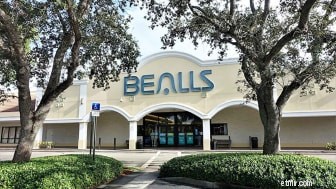
Privately held Cinemex Holdings USA was building a small empire of upscale dine-in movie theaters, with 41 CMX theaters in 12 states. But even though it was in expansion mode, it also was in distress before COVID-19 squeezed the economy.
"Even prior to filing for bankruptcy, we were spending over 30 percent of our revenues on lease-related expenses while studios ended up with 60 percent of every ticket sold," Cinemex told Deadline.
Cinemex had been in negotiations to buy Houston-based Star Cinema Grill when the coronavirus lockdown hit. The deal would have made Cinemex the seventh largest U.S. movie theater chain. However, with theaters shut down, rent due and an uncertain future thanks to COVID-19 concerns, the deal was scuttled. Shortly after, Cinemex filed for Chapter 11 bankruptcy protection.
"We are in a state of complete uncertainty as to when we can re-open our theaters and when our customers will feel safe and secure in returning to them given that there is presently no vaccine against the virus," Cinemex Holdings USA said in a statement. "We cannot forecast when – if ever – customer numbers will return to pre-crisis levels."
In December, Cinemex Holdings USA emerged from bankruptcy protection. The company had spent six months negotiating with landlords, coming out with modified leases that included revenue-sharing provisions. Ten underperforming locations were closed.

Texas-based Diamond Offshore Drilling is one of several energy stocks hit hard by the one-two punch of reduced oil demand thanks to the coronavirus, and the brief Saudi-Russian price war.
As demand dried up, U.S. oil producers began shutting off their oil wells in the Gulf of Mexico, which killed demand for Diamond's drilling rigs. The company had been borrowing heavily, and S&P Global Ratings downgraded the company's debt for a skipped interest payment before Diamond ultimately filed for Chapter 11 bankruptcy protection April 26.
"Like many companies, Diamond has been impacted by the continued downturn in the oil and gas industry," the company said in a release. "Restructuring our finances will allow us to build a bridge to the upturn in the industry when fleet utilization and day rates return to more normal levels."
On Jan. 25, Diamond Offshore Drilling announced its creditors had agreed to a comprehensive restructuring plan. Then in April, the company announced it had exited Chapter 11.
"The restructuring significantly delevers the Company's balance sheet and provides substantial liquidity for the Company, resulting in the equitization of approximately $2.1 billion in senior unsecured note obligations and providing the Company with over $625 million of new available capital," Diamond Offshore said in a statement.
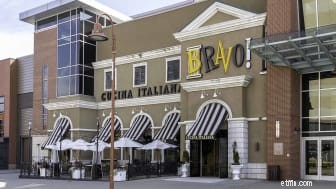
FoodFirst Global Restaurants is the privately held parent company of Italian-themed restaurant chains Bravo and Brio.
The restaurants once belonged to Bravo Brio Restaurant Group, which was founded in 1992. The company went public in 2010 but went private in 2018 via a sale to Spice Private Equity, which renamed the company FoodFirst Global Restaurants. Because of struggles at Bravo and Brio, FoodFirst hired a new CEO in January 2020 to implement a turnaround, with a goal of improving efficiency.
But that turnaround was kneecapped by forced restaurant closures on the heels of the COVID-19 pandemic. FoodFirst Global Restaurants filed for bankruptcy on April 11, writing in its filing:
"The improvement process was radically altered due to the current international health crisis, creating massive restaurant closings and employee losses throughout the country via state ordered shelter-in-place requirements, which exacerbates the need to reduce the Restaurants' footprint in order to maintain the strongest and most viable locations."
FoodFirst had already closed 10 locations permanently in early January and expected to close more as their leases expire.
In June 2020, the Robert Earl Group (operator of Planet Hollywood restaurants) acquired FoodFirst Global's Bravo and Brio restaurants, announcing the deal would see more than 4,000 employees return to work once locations were fully operational.

Unlike many companies on this list, privately held Gold's Gym wasn't struggling prior to the coronavirus pandemic. In fact, the company specifically discounts any prior issues as being a factor in its bankruptcy:
"2019 was our strongest year of worldwide growth in company history," the company writes." No single factor has caused more harm to our business than the current COVID-19 global pandemic and the temporary closures required to protect the safety of our members, team members and communities."
Instead, the May 4 bankruptcy was meant to help the company financially restructure. Gold's said it would permanently close 30 company-owned gyms, but it expected its early 700 global franchised and licensed gyms to reopen.
In July, Gold's Gym announced that German fitness company RSG Group GMBH had won a court-approved auction to buy the chain for $100 million. That plan was approved by a U.S. bankruptcy court in August.

Intelsat (INTEQ, $0.48) isn't one of the kinds of businesses you'd imagine falling to the COVID-19 outbreak. The company helps broadcast and cable TV providers distribute content to customers, as well as provides communications services, via a fleet of 50 satellites.
Intelsat wants to launch new satellite technology that would allow it to sell off part of its C-Band spectrum as part of an FCC airwave auction. That spectrum would be sold to wireless companies as they bulk up their 5G service.
However, "to meet the FCC's accelerated clearing deadlines and ultimately be eligible to receive $4.87 billion of accelerated relocation payments, Intelsat needs to spend more than $1 billion on clearing activities," the company writes. But Intelsat also is servicing nearly $15 billion in debt that previous private equity owners saddled the company with, and the coronavirus pandemic further cramped its financial flexibility.
So, on May 13, the company filed for Chapter 11 bankruptcy protection, which was expected to help relieve some of that debt burden. In fact, CEO Stephen Spengler gave the announcement a positive twist, calling the filing "a transformational moment in the history of our company."
"This will position us to invest and pursue our strategic growth objectives, build on our strengths, and serve the mission-critical needs of our customers with additional resources and wind in our sails," he writes.
Despite being in bankruptcy, Intelsat continued to wheel and deal. In September, the company used $400 million of a $1 billion bankruptcy loan to buy the inflight Wi-Fi business of Gogo (GOGO).
In February 2021, Intelsat said it had reached an agreement with some of its creditors. The proposed plan would cut the company's debt to $7 billion and give unsecured debt holders 95% of the company's new shares. However, as of July, Intelsat still had not emerged from Chapter 11 bankruptcy.

J.C. Penney , one of the nation's largest department-store chains with nearly 850 locations, has long faced the same uphill battle as many of its brick-and-mortar competitors. The launch of its own e-commerce site, as well as experimenting with new store formats, hasn't been enough to reinvigorate the retailer.
Even during the 2019 holiday season, which saw record consumer spending, J.C. Penney's same-store sales (stores and websites open for at least 12 months) declined 7.5% year-over-year.
Store closures due to the COVID-19 pandemic were the final straw. On May 15, the company was forced to seek out Chapter 11 bankruptcy protection, and it also announced a restructuring support agreement that would help it "reduce several billion dollars of indebtedness."
Several days after that filing, the company said it plans to permanently close 242 J.C. Penney locations by 2021.
In September, Simon Property and fellow mall operator Brookfield Property Partners LP (BPY) were reported to be closing in on a deal worth $800 million to buy out the retailer. In December, the deal closed and J.C. Penney exited Chapter 11 bankruptcy protection, avoiding liquidation.

American clothing retailer J. Crew began life as Popular Merchandise in 1947 before taking on its current name in 1983. It initially was a catalog operation, but it expanded into J. Crew retail stores and eventually added the Madewell brand. Then in 2011, private equity firms TPG Capital and Leonard Green &Partners paid $3 billion to acquire J. Crew.
The company known for its "preppy" clothing has been accumulating debt ever since, owing roughly $1.7 billion as of Feb. 1. Declining sales have dogged the legacy brand, but Madewell was growing so much that J. Crew considered "unlocking" value by spinning it off via an initial public offering.
The coronavirus lockdown and resulting store closures derailed that plan, at least temporarily. J. Crew filed for Chapter 11 bankruptcy protection on May 4.
"We are and will remain fully operational throughout this restructuring process," J. Crew said in a statement. "We will continue operating under the COVID response measures currently in place and look forward to reopening our stores in accordance with CDC guidance as quickly and safely as possible."
In September, J. Crew announced it had completed financial restructuring and was emerging from Chapter 11 protection, with Anchorage Capital Group as the majority owner of the company.
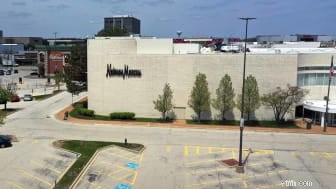
Privately held Neiman Marcus is an iconic, luxury retail chain that was founded in 1907. Its latest store, which opened in 2018, was a three-floor, 188,000-square-foot location in Manhattan's Hudson Yards development. In addition to 43 Neiman Marcus locations, it also owns 22 Last Call outlets and two Bergdorf Goodman stores.
But the company has been struggling under about $5 billion in debt, as well as watching customers abandon its lavish department stores for the comfort of online shopping.
COVID-19 forced Neiman Marcus to temporarily close all of its stores, which ultimately was the company's breaking point. Neiman Marcus filed for Chapter 11 bankruptcy protection on May 7, with CEO Geoffroy van Raemdonck writing:
“Prior to COVID-19, Neiman Marcus Group was making solid progress on our journey to long-term profitable and sustainable growth. … However, like most businesses today, we are facing unprecedented disruption caused by the COVID-19 pandemic, which has placed inexorable pressure on our business.”
On Sept. 25, Neiman Marcus announced it had completed its Chapter 11 bankruptcy restructuring. As expected, the company was able to eliminate over $4 billion in debt, as well as $200 million in annual interest payments. The company's new owners include Davidson Kempner Capital Management, Pimco and Sixth Street Partners.
The new Neiman Marcus is leaner with fewer in-store staff. It plans to focus on a luxury lifestyle and online selling (including connecting with its customers through digital services), while also trying to attract new millennial and Gen Z shoppers.

Many of the companies on this list expect to continue operating during and after their bankruptcy reorganizations. But Pier 1 Imports could be done for good.
Pier 1 Imports, which has already closed hundreds of stores over the past few years, has simply been unable to fight the one-two punch of growing online competition from e-commerce stocks such as Amazon.com (AMZN) and Wayfair (W), as well as big-box stores such as Target (TGT) and Walmart (WMT).
Pier 1 had already closed 402 of its more than 940 stores before filing for Chapter 11 bankruptcy protection on Feb. 17, before COVID-19 started hammering U.S. retail.
But the coronavirus nonetheless dealt the death blow. On May 19, Pier 1 announced it was giving up on its previous bankruptcy plans and simply liquidating, shutting down its remaining 540 or so stores.
"This decision follows months of working to identify a buyer who would continue to operate our business going forward," CEO Robert Riesbeck said in a press release. "Unfortunately, the challenging retail environment has been significantly compounded by the profound impact of COVID-19, hindering our ability to secure such a buyer and requiring us to wind down."
Retail Ecommerce Ventures (REV) paid $30 million for the retailer's name and intellectual property in July. In October, REV began operating Pier 1 Imports as an e-commerce site.

Houston-based Stage Stores operates hundreds of stores across 42 states under banners including Stage, Bealls, Palais Royal, Peebles, Goody's and Gordmans. These stores focus on moderately priced and discount goods, and are predominantly located in small towns and rural areas.
Most of Stage Stores' brands were previously snapped up in bankruptcy sales, and the company had been planning to convert all stores to the Gordmans banner. Stage had a considerable debt load and suffered poor holiday sales in 2019, but it was working on strengthening its financial position and seeking prospective buyers when the COVID-19 pandemic forced it to shutter its stores.
On May 11, it threw in the towel and declared bankruptcy:
"The increasingly challenging market environment was exacerbated by the COVID-19 pandemic, which required us to temporarily close all of our stores and furlough the vast majority of our associates," Stage Stores wrote in a release. "Given these conditions, we have been unable to obtain necessary financing and have no choice but to take these actions."
In August, Stage Stores announced court approval for its bankruptcy plan, which involved liquidating all stores and winding down the company after attempts to find a buyer fell through. In October, Florida-based Bealls Inc. paid $7 million for Stage Stores' trademarks and store names – including Bealls, which Bealls Inc. had previously only been able to use in Florida, Georgia and Arizona.
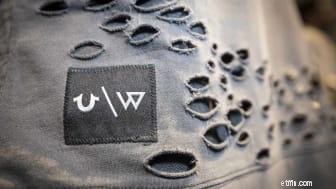
California-based jeans maker True Religion , the California-based maker of high-end jeans, filed for bankruptcy on April 13. That's the second time it has done so in three years; it also filed in 2017 and re-emerged with $390 million less in debt.
Sales of True Religion jeans have been hit by slowing spending at department stores including Macy's and the aforementioned Neiman Marcus. The rise in popularity of athleisure wear was also putting pressure on demand for denim.
The coronavirus outbreak sealed its fate, however. The company was forced to close its 87 retail stores and its wholesaling arm.
"These closings have caused a sudden and unplanned elimination of approximately 80% of the Company's revenue, making a chapter 11 filing unavoidable," Interim CFO Richard Lynch wrote in court documents.
On Oct. 20, however, True Religion successfully emerged from Chapter 11 bankruptcy protection with a reduced debt load and lowered operating expenses. Simon Property Group, the landlord for many of True Religion's retail properties, "was an essential partner in the Company’s reorganization."
The number of stores that will reopen was trimmed down from pre-bankruptcy levels to 50.

Many U.S. shale oil producers were already under financial pressure before the start of 2020. Thanks to low oil prices and high debt loads, 41 oil companies filed for bankruptcy protection in 2019.
More of the same is likely on the way. A report by Norwegian energy research firm Rystad Energy says that if oil prices remain low, more than 240 U.S. energy firms might have to seek out bankruptcy protection by the end of 2021.
Whiting Petroleum (WLL, $48.66) managed to make it to 2020, but the U.S. fracker finally succumbed on April 1, when it filed for Chapter 11 bankruptcy protection. That comes alongside an agreement that saw Whiting debtholders acquire a 97% equity stake in the company in exchange for taking $2.2 billion in debt off the books.
"Given the severe downturn in oil and gas prices driven by uncertainty around the duration of the Saudi / Russia oil price war and the COVID-19 pandemic, the Company's Board of Directors came to the conclusion that the principal terms of the financial restructuring negotiated with our creditors provides the best path forward for the Company," Whiting Petroleum wrote in a press release.
ভাল খবর? Whiting actually emerged from Chapter 11 bankruptcy protection on Sept. 2. Unfortunately, the perceived jump in "WLL" shares was a bit of a mirage. The old WLL shares were completely wiped out and replaced with new shares as of Whiting's emergence. Those shares have done well in 2021, however, up nearly 95% year-to-date.